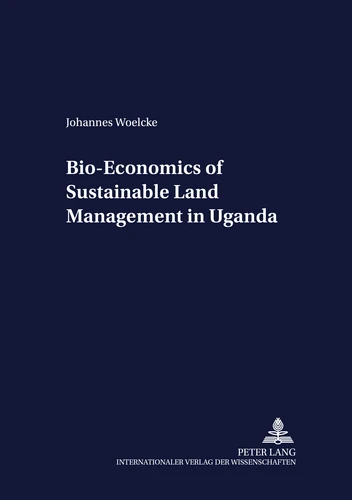Bio-Economics of Sustainable Land Management in Uganda
Par :Formats :
- Paiement en ligne :
- Livraison à domicile ou en point Mondial Relay indisponible
- Retrait Click and Collect en magasin gratuit
- Nombre de pages181
- ISBN3-631-51217-1
- EAN9783631512173
- Date de parution01/10/2003
- CollectionDevelopment Economics and Poli
- ÉditeurPeter Lang
Résumé
Land degradation is a serious economic and environmental threat contributing to declining agricultural productivity, poverty and food insecurity. The extent and rate to which land degradation occurs is of growing concern, particularly in developing countries. Why do poor farm households deplete their soils ? This case study of Uganda provides a better understanding of farm household economics in the context of sustainability issues.
A bio-economic model has been developed to run scenarios of high relevance for the current reform process in the agricultural sector. Economic and ecological impacts of the adoption of new land management practices are explored. Finally, policy conclusions and implications are derived which can contribute substantially to the current policy debate.
A bio-economic model has been developed to run scenarios of high relevance for the current reform process in the agricultural sector. Economic and ecological impacts of the adoption of new land management practices are explored. Finally, policy conclusions and implications are derived which can contribute substantially to the current policy debate.
Land degradation is a serious economic and environmental threat contributing to declining agricultural productivity, poverty and food insecurity. The extent and rate to which land degradation occurs is of growing concern, particularly in developing countries. Why do poor farm households deplete their soils ? This case study of Uganda provides a better understanding of farm household economics in the context of sustainability issues.
A bio-economic model has been developed to run scenarios of high relevance for the current reform process in the agricultural sector. Economic and ecological impacts of the adoption of new land management practices are explored. Finally, policy conclusions and implications are derived which can contribute substantially to the current policy debate.
A bio-economic model has been developed to run scenarios of high relevance for the current reform process in the agricultural sector. Economic and ecological impacts of the adoption of new land management practices are explored. Finally, policy conclusions and implications are derived which can contribute substantially to the current policy debate.

